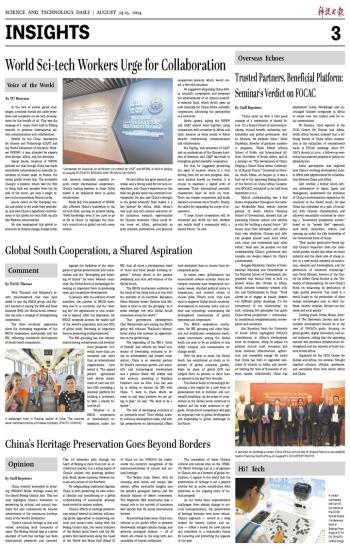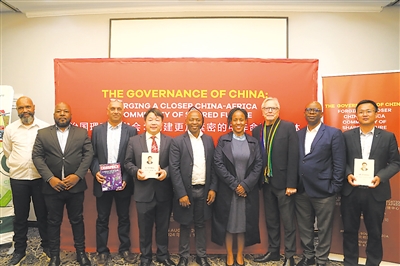
 |
| A seminar on building a closer China-Africa community of shared future is successfully held in Pretoria, South Africa, on August 15. (COURTESY PHOTO) |
"China came up with a very good concept of a community of shared future. It's a shared future of interconnectedness, mutual benefit, inclusivity, sustainability and global governance. And as Africans, we embrace them," Edith Phaswana, director of graduate academic programs, Thabo Mbeki African School of Public and International Affairs, University of South Africa, said at a seminar on "The Governance of China: Forging a Closer China-Africa Community of Shared Future." Convened in Pretoria, South Africa, on August 15, it was a lead-up to the upcoming Beijing Summit of the Forum on China-Africa Cooperation (FOCAC), scheduled to be held from September 4 to 6.
Mutual understanding was a key theme emphasized throughout the seminar. Botshabelo Maja, deputy director general of South Africa's National School of Government, stressed that appreciating Chinese culture and identity is vital for building a shared future. "Africans must first introspect and define their own identities. Chinese and African peoples should learn more about each other, and understand each other better," Maja said. He pointed out that understanding China's governance philosophy can deepen respect for China's achievements.
Bongani Mayimele, director of International Relations and Partnerships at the National School of Government, emphasized that mutual trust is built on shared values like Ubuntu in Africa, which denotes humanity towards others, and Confucianism in China. "Trust allows us to engage as equals, despite our different global standings. It's the cornerstone of our relationship," he said, outlining five principles that guide China-Africa cooperation — commonality, consistency, complementarity, convergence and consensus.
Qin Xiaoshun from the University of South Africa highlighted FOCAC's contributions to Africa's development since its inception, citing its impact on political mutual trust, economic and trade relations, infrastructure, agriculture, and renewable energy. He noted that China has built or upgraded hundreds of schools in Africa and provided training for tens of thousands of African talents. Additionally, China has established Luban Workshops and encouraged Chinese companies in Africa to create over one million jobs for local communities.
Ni Yanshuo, chief reporter at the CICG Center for Europe and Africa, South Africa bureau, stressed that a defining feature of China-Africa cooperation is the realization of commitments made at FOCAC meetings. Since FOCAC's launch in 2000, a follow-up committee has ensured progress in policy implementation.
Some participants also explored how China's evolving development model offers new opportunities for collaboration between China and Africa.
Gert Grobler, a former South African ambassador to Spain, Japan and Madagascar, underscored the relevance of China's modernization experience for countries in the Global South. He said China has embarked on a path of socialism with Chinese characteristics and achieved remarkable outcomes by creating a "moderately prosperous society" based on its "people first" approach, hard work, innovation, reform, and opening up under the able leadership of the Communist Party of China.
"New quality productive forces signify China's departure from the traditional growth model that relies on heavy industry and the sheer size of cheap labor, to a new model centered on innovation, research and development, and the production of advanced technology," said David Monyae, director of the Center for Africa-China Studies at the University of Johannesburg. He said China's focus on enhancing its production of high-quality products "has made it a world leader in the production of clean energy technologies such as wind turbines, electric vehicles, lithium-ion batteries and solar panels."
Looking ahead, Kirtan Bhana, director of The Diplomatic Society, said sustainable development should be at the core of FOCAC's goals, focusing on green growth, digital innovation, and social inclusion, adding that the upcoming summit will prioritize infrastructure development and the removal of trade barriers across Africa.
Organized by the CICG Center for Europe and Africa, the seminar brought together scholars, officials, professors, and journalists from both South Africa and China.


 Next
Next




